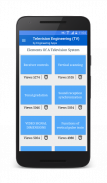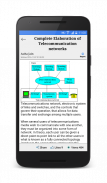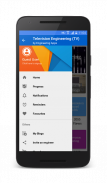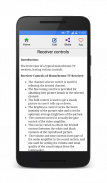










Television (TV) Engineering

Description of Television (TV) Engineering
Television Engineering is a free educational application designed for individuals interested in TV engineering topics. The app serves as a resource for quick study and revision, particularly beneficial during exams, interviews, or assignments. It is available for the Android platform, allowing users to easily download this tool to enhance their understanding of television systems.
The application encompasses a wide range of topics, effectively breaking down complex concepts into simple English. Users can explore 150 topics organized into five chapters, each designed to provide both theoretical knowledge and practical insights. The clear and straightforward notes aim to facilitate faster learning, making it a useful tool for students at various academic levels.
One of the main sections of the app introduces users to the fundamental aspects of television systems. This introductory chapter lays the groundwork for understanding more advanced topics, such as the workings of different television components and technologies. It helps users grasp the basic principles that underlie television engineering.
Another crucial aspect covered in the app is the Vidicon TV camera tube. This section delves into the technology behind image capture in television systems, explaining how the Vidicon tube functions and its relevance in the industry. This topic is essential for those studying the technical side of television production.
The app also addresses sound transmission, a key element in television engineering. It discusses how audio signals are transmitted and received, providing insights into the synchronization of sound with picture reception. This knowledge is vital for understanding the overall operation of television systems and the importance of sound quality in broadcasts.
Picture reception is another important topic included in the app. It explains how images are received and processed in television systems, detailing the mechanisms involved in displaying clear and accurate visuals. This section is particularly beneficial for students studying the technical aspects of video display technologies.
Additionally, the application covers synchronization of sound reception, which is crucial for ensuring that audio and visual components align seamlessly. Users will learn about the various methods and technologies used to achieve synchronization, enhancing their understanding of broadcast quality.
Receiver controls are also examined within the app, providing users with knowledge about how different controls impact television reception and performance. This information is essential for anyone looking to understand the functional aspects of television receivers.
The app includes detailed information on color television and color receiver controls. Users will explore how color transmission works, including the principles of mixing and displaying colors on screen. This topic is particularly relevant given the prevalence of color TV in modern broadcasting.
The application also dives into technical details such as horizontal and vertical scanning, which are fundamental concepts in television image formation. By understanding these scanning methods, users can appreciate how images are constructed and displayed on screens.
Relevant topics such as flicker, interlaced scanning, and scanning periods are also included. These discussions provide insights into the challenges and techniques associated with maintaining image quality and stability in television broadcasts.
The app addresses important concepts like vertical and horizontal resolution, explaining how these factors affect picture clarity. Users will learn about interlace errors and tonal gradation, which are significant in delivering high-quality visuals.
Furthermore, the app discusses video signal dimensions and the role of blanking pulses in the transmission of video signals. Detailed explanations cover horizontal and vertical sync details, providing users with a comprehensive understanding of synchronization in television systems.
Another essential area covered is sync pulse separation, which is pivotal in generating vertical and horizontal sync pulses. This topic contributes to users' knowledge of how synchronization is maintained in television broadcasts.
Equalizing pulses and their functions within the vertical pulse train are also explained. This section enhances the understanding of signal processing in television engineering.
The app provides insights into the sync details of the 525 line system, which is a standard in television broadcasting. Users will learn about the historical and technical significance of this system in the evolution of television.
Topics such as amplitude modulation and channel bandwidth are also included, offering users a grasp of how signals are transmitted and the efficiency of different transmission methods. Vestigial sideband transmission is another technical aspect covered, detailing its advantages in broadcasting.
Reception of vestigial sideband signals is discussed as well, informing users about the practical implications of this transmission method in modern television engineering.
Television Engineering proves to be a valuable resource for those interested in the technical and theoretical foundations of television systems. The app's structured approach to complex topics allows for effective learning and revision, making it an essential tool for students and professionals alike. Users can easily download this app to gain a deeper understanding of the principles that drive the television industry.


























